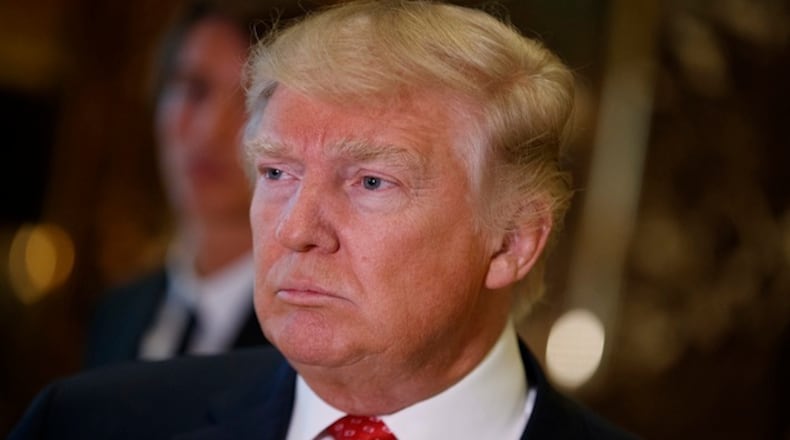President Donald Trump showed in his first days in office that his combative, self-aggrandizing campaign persona isn't going away, a sign that he hasn't yet made the transition from running for office to governing as he embarks on a high-stakes first week.
In the earliest hours of his presidency, with the full weight of military and economic decision-making in his grasp, he fixated on his TV ratings and the crowds at his inauguration. He even issued a tweet disparaging participants in the women's march protest on Saturday by questioning whether they voted.
"It would be nice for him to start acting more presidential," Republican strategist John Feehery said. "I'm not sure he is going to change though, and this might just be the new normal and everyone is going to have to get used to it."
Trump was angered over the weekend by media coverage comparing attendance at his inauguration unfavorably with Barack Obama's first inaugural and the women's protest march against him, as well as a White House pool journalist's erroneous report that a bust of Martin Luther King had been moved out of the Oval Office, said real estate investor Tom Barrack, a long-time friend. Though the pool report was corrected after Trump aides denied it, the retracted information had already been posted on Twitter.
"If you are going to hold me accountable with the fact checks on everything I do, I'm going to hold you as equally accountable on the other end," Barrack, the inauguration committee chairman, who spoke to the president over the weekend, said of his friend's thinking. "What you hold me to, I'm going to hold you to."
White House Chief of Staff Reince Priebus described an administration that felt its standing was undermined by media coverage of crowd turnout.
"There's an obsession by the media to delegitimize this president, and we are not going to sit around and let it happen," Priebus said on Fox News Sunday. "We're going to fight back tooth and nail every day, and twice on Sunday."
Establishment Republicans had hoped a more conciliatory, presidential Trump would appear on Jan. 20 and that his public skirmishes with opponents, no matter how immaterial — an obsession that plagued his campaign and lasted into the transition — would fall to the wayside under the weight of the presidency. Trump pledged he wouldn't change his style once he became the president, and it's looking increasingly likely he will keep his word.
"I'm not sure we are ever going to get a pivot," Feehery said. "I think the Republicans have to learn to love some of what he is doing because it isn't all bad — it can distract attention from them."
While Republicans control both chambers of Congress, it's important for Trump to keep the party united, unlike on the campaign trail when many lawmakers in his party defected over his controversial comments on immigrants and women. The Senate is especially crucial, where business could grind to a halt if only a few Republicans jump ship.
Sen. John McCain, R-Arizona, gave a tepid response on ABC's "This Week" on Sunday after host George Stephanopoulos asked if he has confidence in the president.
"I do not know, George. I do not know," McCain replied.
Among world leaders, Trump's tough talk in his Inauguration Day speech -- when he invoked the image of a U.S. plagued by weak borders, lopsided alliances and bad trade deals and promoted an "America First" view of foreign policy — undermined any expectations that the new president would moderate his protectionist campaign tone.
"Every single step of the way, now as president of the United States, instead of getting bigger and the office holding him up, he's gotten actually smaller in the course of this, even more petty," Matthew Dowd, the chief strategist for former President George W. Bush's campaign and a Trump critic during the election, said on "This Week."
In Trump's first full day as president he visited the Central Intelligence Agency's headquarters and delivered a rambling speech in which he talked mostly about himself -- recounting his election, the number of CIA employees who voted for him, the number of times he's appeared on the cover of Time Magazine, and even remarking that he feels physically like a 30-year-old, or perhaps a 39-year-old.
Standing in front of a memorial for CIA employees killed in service, Trump accused the media — whom he termed "among the most dishonest human beings on Earth" — of inventing a "feud" between him and the U.S. intelligence community. In fact, Trump has fought a running public battle with intelligence community leaders for months over their conclusion that the Russian government intervened in the presidential campaign, going so far as to suggest that the CIA was the source of leaks against him.
Later on Saturday, White House press secretary Sean Spicer took to the podium in the White House briefing room for the first time to claim, falsely, that Trump's inauguration audience was the largest ever, and to scold news organizations for reporting otherwise.
Attacking the coverage in a news briefing "isn't the approach I would take," Barrack said, adding, "the president is smarter at this than I."
About the Author
Keep Reading
The Latest
Featured



